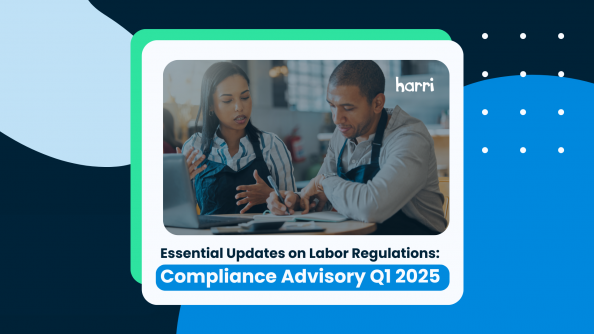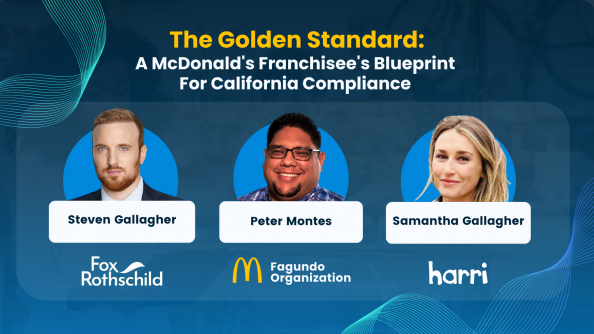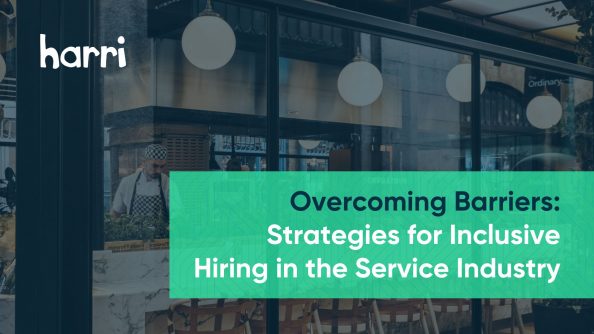How to Master Employee Communication in Hospitality
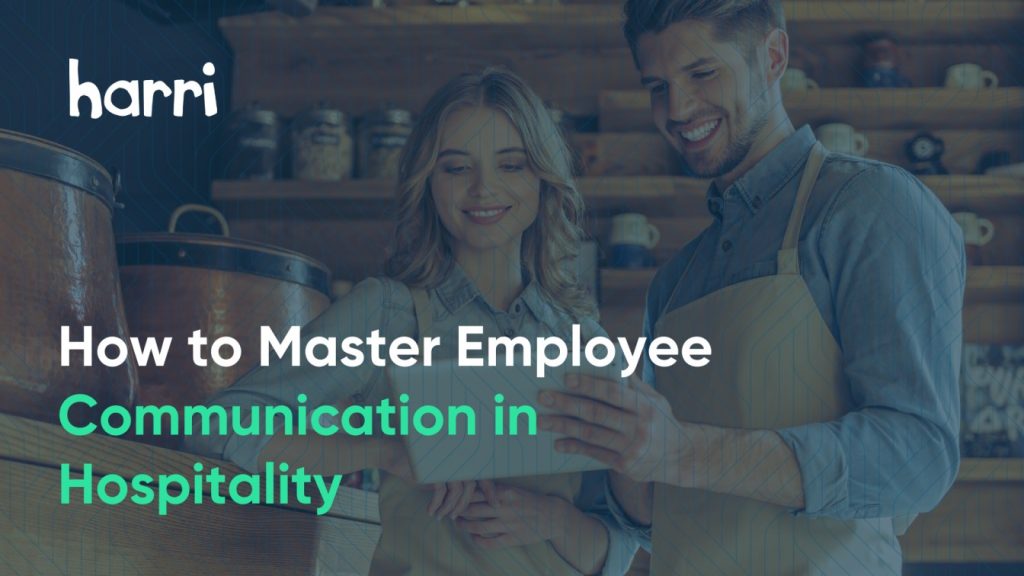
- By Harri Insider Team | February 1, 2024
Effective communication is not just about delivering messages; it’s about building relationships, ensuring operational efficiency, and fostering a workplace culture that values every team member. Whether it’s onboarding new hires, recognizing their achievements, managing schedules, or ensuring every voice is heard, communication stands at the heart of successful hospitality management and directly impacts the quality of the employee experience.
Onboarding and New Hire Communication
Effective communication in the first ninety days with a new employee is vital for ensuring early retention, facilitating rapid integration into the team, building the employee’s confidence, and establishing a constructive feedback loop. It also plays a crucial role in maintaining the new hire’s engagement and motivation, ultimately laying the groundwork for their long-term success and satisfaction within the organization.
“Harri Engage is helping us spot opportunities to ensure new starters feel adequately trained in their first few weeks and months with us, giving managers the insight they need to know when to intervene and help drive employees towards success in those critical first 90 days.” – Cafua (Dunkin Donuts franchise)
Consider focusing on the following to optimize communication during the onboarding pages: have managers conduct regular check-ins, maintain open communication channels, and have simple feedback mechanisms. Onboarding should be structured and centralized, so new employees can access all of their documents and training materials in one place. Additionally, introducing new team members in an open forum to encourage the rest of your staff to say hello will help them feel welcomed and integrated into the team.
Sample post for new team member introduction
I’m thrilled to introduce our newest member, Alex Smith, who joins us as a Server at our [Specific Location]. Alex comes to us with a wealth of experience in customer service and a passion for hospitality.
A little about Alex: they’re a huge fan of [Favorite Sports Team], enjoy [Hobby], and already love our [Signature Menu Item] – so they’re definitely one of us! Alex is excited to bring their skills and enthusiasm to the team, and I’m sure they will be a fantastic addition to our [Brand Name] family.
Please extend a warm welcome and feel free to share your tips and experiences with [Brand Name] to help them settle in.
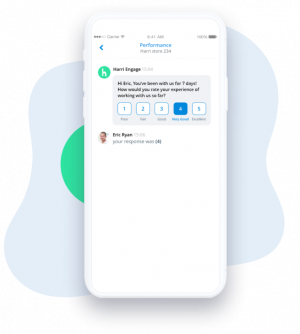
Rewards and Recognition in Hospitality
Recognizing and rewarding hospitality workers effectively hinges on clear communication. This approach ensures that employees feel valued and acknowledged, fostering morale and motivation. It also cultivates a positive work culture, serves as a performance incentive, and is key to high employee satisfaction and retention.
Communicating recognition and rewards to employees is an art that significantly impacts their morale and sense of belonging. Celebrating important milestones and achievements, whether in team meetings or via internal communications, helps in acknowledging individual contributions. Harri Engage makes it simple to celebrate milestones by automating communication with employees. Occasions like birthdays and work anniversaries can be set up during onboarding, with customizable templates going out to staff on their respective dates. Publicly acknowledging employees in shared communication hubs helps celebrate employee accomplishments and plays a role in engaging your entire team. Personalized thank you messages for hard work, clearly communicated opportunities for professional growth, and performance-based bonuses are also effective.
Sample Communication Plan for Employee Rewards and Recognition Program
Define Goals, Objectives, and Alignment with Company Culture: Clearly outline the desired outcomes of the recognition program, such as improving morale or recognizing specific achievements.
Identify Channels and Tools: Utilize digital platforms for efficient communication of recognitions. Harri, for example, is ideal for posting announcements and sharing recognition stories directly with frontline staff.
Determine Communication Frequency: Establish a regular rhythm for recognitions, like ‘Employee of the Quarter’ announcements, to ensure ongoing engagement.
Involve and Empower the Team: Create opportunities for team celebrations and utilize platforms like Harri Engage for employees to offer input and feedback on the recognition process, fostering a collaborative environment.
Effective Employee Scheduling Communication
Effective communication in scheduling is as crucial as paychecks for hospitality team members. Clear communication minimizes scheduling conflicts and misunderstandings, fostering a more harmonious work environment. Such clarity in scheduling not only enhances operational efficiency and employee satisfaction but also directly impacts the quality of the employee experience.
Consistency in posting schedules at the same time and place ensures team members know when and where to check for their schedules. Harri’s scheduling tool allows the ability to send push notifications as soon as the schedule is published, as well as for any unassigned shifts available to claim. It helps to have a centralized place for peer-to-peer communication so employees can easily swap shifts with each other. Ideally, this would live on a separate app versus something like text messaging or WhatsApp, so you can promote a good work-life balance by keeping work and private conversations separate.
Strategies for Efficient Company Communications
Advance Notice: Publish schedules well in advance to allow employees time to plan.
Consistency: Post schedules at the same time and place each week for predictability.
Accessibility: Ensure schedules are easily accessible, ideally available on a digital platform.
Clear Communication: Be clear about shifts, roles, and any special instructions for each shift.
Feedback Mechanism: Provide a way for employees to communicate availability and request time off.
Flexibility: Be open to swapping shifts or making adjustments as needed, within reason.
Emergency Protocols: Have a clear plan for communicating last-minute changes or emergencies.
Targeted and Company-Wide Communications in Hospitality
Open and transparent company-wide communication fosters trust and a sense of shared responsibility among employees, contributing to a more cohesive and dedicated workforce. Targeted communications are essential for addressing the unique needs of different roles and locations. However, not all announcements are relevant to everyone. It’s important to segment your communication depending on the intended audience to optimize efficiency and ensure each team receives relevant and actionable information.
Sharing timely and relevant information is the key to communicating targeted or company-wide messages. Utilizing notifications during clock-in for new menu items or specials efficiently updates employees, especially useful during busy shifts when traditional meetings are challenging. Additionally, sharing location-specific news, like upcoming sporting events or concerts, via digital platforms keeps specific location teams informed and equips them to engage knowledgeably with customers, enhancing the guest experience. Harri simplifies the process of communicating with your teams, whether you need to send announcements to everyone, or segment specifically by location or role.
The Importance of Gathering Employee Feedback
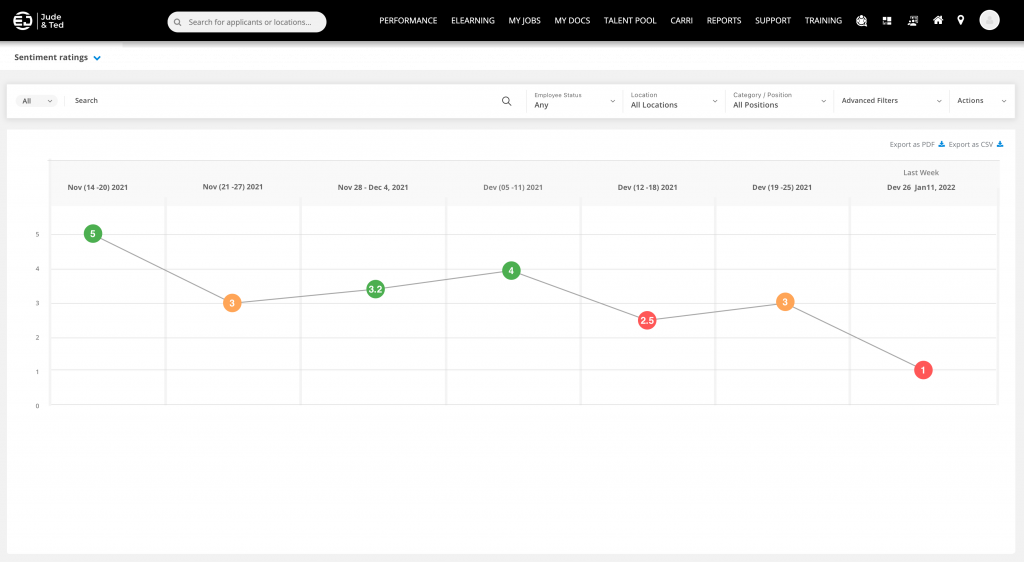
Gathering feedback from frontline workers in hospitality is vital for enhancing their experience and improving operations. It provides essential insights into daily operations, boosts employee engagement by valuing their opinions, helps in early identification and resolution of issues, fosters innovation, and directly contributes to enhancing customer satisfaction. This feedback loop is a key factor in maintaining smooth operations and ensuring both employee and customer contentment.
It’s crucial to create a safe and open environment where feedback is encouraged and valued. Regularly providing opportunities for feedback ensures ongoing communication – asking direct, specific questions yields focused insights. Feedback can be as simple as a quick pulse survey when someone checks out of their shift – ‘How was your shift today?’ – with a star rating out of 5. Or, you could set up a ‘smiley face’ reaction to quickly gauge how happy or unhappy staff feel when leaving work.
Importantly, acting on the feedback and engaging in two-way communication demonstrates that employee input is taken seriously and can lead to change. Following up on feedback by discussing outcomes and actions with employees reinforces the value of their contributions, fostering a culture of transparency and continuous improvement in the workplace.
Sample questions to elicit quality feedback from hospitality employees
Job Satisfaction: What aspects of your job do you find most fulfilling or challenging?
Work Environment: How would you describe our establishment’s work environment and culture?
Support and Resources: Do you feel you have the necessary tools and support to effectively perform your job?
Communication: How effective is the communication you receive from management and team leaders?
Training and Development: Are there any additional training or development opportunities you would like to see implemented to enhance your skills?
Team Dynamics: How do you feel about the teamwork and collaboration within your team?
Management and Leadership: What can management do to better support you and your colleagues?
Work-Life Balance: How well do you think our scheduling practices accommodate your work-life balance?
Customer Interaction: Do you have suggestions for improving our guest experience?
Workplace Improvement: What changes would you recommend to improve our workplace?
Mastering communication with your hospitality team is pivotal for enhancing the overall employee experience. Harri was built to help you facilitate this transformation, offering tools that streamline onboarding, facilitate effective scheduling, and provide platforms for meaningful recognition and feedback. Its capabilities in segmenting communications and offering real-time insights ensure that every message is impactful and relevant.
To find out how you can revolutionize the employee experience through effective communication and engagement, explore Harri Engage.







